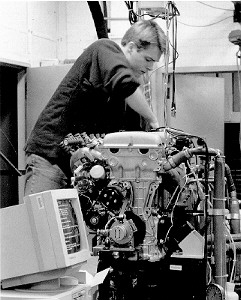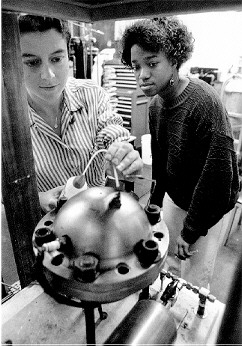More than 25% of the total energy (and 60% of the petroleum) consumed in the United States is used for transportation. The Energy Laboratory's Transportation Propulsion research focuses on both improving existing types of engines and developing new concepts. During more than two decades our work has yielded theoretical models, diagnostic tools, and technological insights that have helped the automotive industry develop more efficient, cleaner transportation systems.
Research interests fall into four general areas: fundamental combustion studies, internal combustion engine research, engine design, and policy and technology studies related to broader transportation issues. Current fundamental research activities include examination of hydrocarbon oxidation chemistry and use of vortex dynamics methods to model turbulent, chemically reacting flows. Internal combustion engine research includes studies of factors that control fuel-air mixture preparation, emissions formation mechanisms, turbulent flame development and its cycle-to-cycle variation, and knock in spark-ignition engines, diesel combustion, diesel emissions formation, effect of fuel composition on engine performance and emissions, computational fluid-dynamics modeling of engine flows and combustion, computer simulation of the operating and emissions characteristics of engines, piston-ring friction and lubrication, oil consumption mechanisms, engine heat transfer, new engine concepts, and use of alternative fuels in engines.

Graduate student Peter Hinze
Engine-related research takes place in the Sloan Automotive Laboratory, which has eleven test cells equipped with a variety of test engines, special facilities for combustion and flow visualization, and other devices used in engine and applied combustion research. The fundamental studies are generally carried out in the Reacting Gas Dynamics Laboratory.
Much of the research involves modeling the processes that are important to engine and burner operation. A major output from this work is computer programs that predict different aspects of the performance characteristics of these devices based on an analysis of the critical physical and chemical processes that occur.
Engine design activities currently focus on improving the analysis tools used to aid engine development and examining aspects of concurrent engineering in engine design.
Policy work centers on transportation vehicle technology, its energy use and
its environmental impacts, technology assessment, and the management of research
and development in the auto industry. In collaboration with the Center
on Airborne Organics, researchers are assessing how specific regulatory
actions would affect the quantity and chemical composition of emissions in the
northeastern United States.
New initiatives in transportation energy use and its environmental impacts are being explored. One area of interest is matching of cleaner burning petroleum-derived fuels with future engine technologies. Technologies considered include direct-injection engines and low-emission diesels.
Selected Participants
- Wai K. Cheng, Mechanical Engineering: combustion diagnostics and modeling;
diesel combustion and heat transfer.
- Ahmed F. Ghoniem, Mechanical Engineering: combustion; turbulent reacting
flow modeling.
- John B. Heywood, Mechanical Engineering: engine performance, efficiency,
and emissions.
- Simone Hochgreb, Mechanical Engineering: combustion fundamentals; chemical
kinetics and emissions.
- David P. Hoult, Mechanical Engineering: engine lubrication and friction.
- James C. Keck, Mechanical Engineering: combustion kinetics; flame fundamentals.
- Victor W. Wong, Energy Laboratory: engine operating and emission characteristics; lubrication in engines.
- Jackie Y. Ying, Chemical Engineering: catalytic converter materials synthesis.
Great emphasis is placed on making our research findings and analytical tools available to the engineering community at large. One means of interaction is through industrial consortia in which groups of companies sponsor research on promising new engine, fuels, and lubricant opportunities. Representatives from each member company help select the individual research tasks undertaken, play a significant role in the ongoing research, and often spend extended time at MIT participating in the research projects. Three major consortia are now active.

Professor Simone Hochgreb and undergraduate Rae L. Lewis.
Engine Research: Spark-Ignition Engines
This program, established in 1981, focuses on combustion and emissions in spark-ignition engines. Investigators are conducting parallel research programs ranging from development of a knock-prediction model and examination of pollutant-formation mechanisms to application of new practical combustion-diagnostic tools for studying parameters affecting engine performance.
Lubrication in Internal Combustion Engines
This program, formed in 1989, focuses on understanding how lubrication affects engine fuel consumption, component wear, oil consumption, and emissions from internal combustion engines. The primary goals are to develop and apply advanced diagnostics to describe lubricant-film behavior and to develop theoretical models that relate detailed lubricant-film measurements to engine performance parameters.
Engine/Fuels Interactions in Spark-Ignition Engines
Current and future air quality regulations have motivated oil and automotive companies to pursue new fuels and new strategies for controlling emissions. This program, started in 1991, explores how changes in fuels anticipated during the 1990s will affect the combustion process and emissions. Projects examine the effects of fuel composition changes on the fuel-air mixture preparation, hydrocarbon emission behavior, and engine performance during the start-up period.
Back to Current Research Areas or
 the Energy
Laboratory Home Page.
the Energy
Laboratory Home Page.




 the Energy
Laboratory Home Page.
the Energy
Laboratory Home Page.